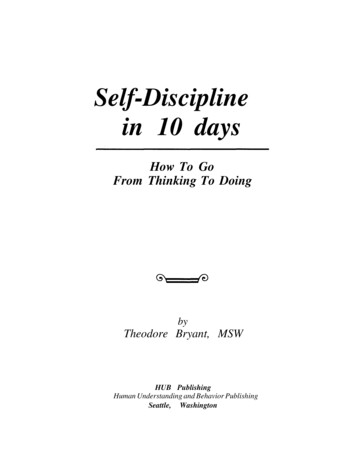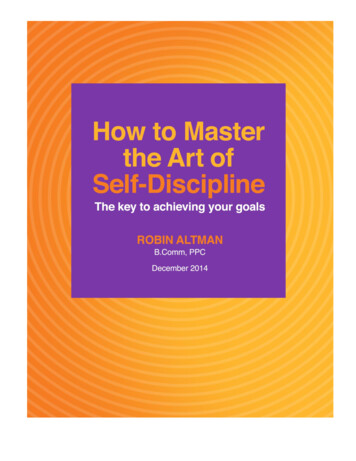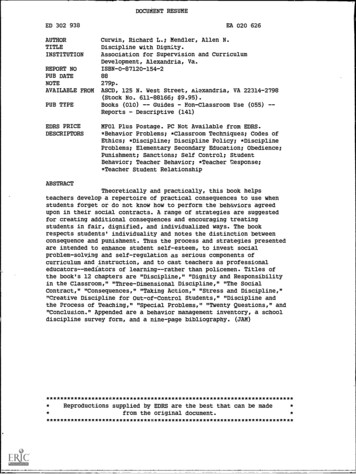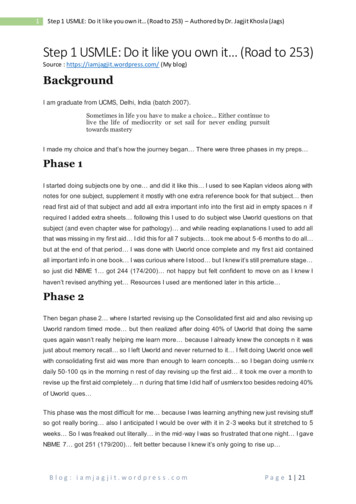
Transcription
Self-Disciplinein 10 daysHow To GoFrom Thinking To DoingbyTheodore Bryant, MSWHUB PublishingHuman Understanding and Behavior PublishingSeattle, Washington
Dedicated.to all the people who haveattended my self-disciplinecourses, seminars, and lectures.You provided me with the desireand motivation to write thisbook. You enabled me to createa self-discipline system that canwork for anyone. But, moreimportant, you taught me thatlife's greatest pleasure lies inhelping others accomplish theirdesires. For this simple lesson,I thank you from the bottom ofmy heart.
Table Of ContentsPart OnePreliminary Information Important!2 How To Use This Guidebook51. Getting Started72. Poisons & Antidotes133. Action-oriented Self-talk314. Understanding Self-Discipline41Part TwoThe Ten Day Self-Discipline Development System Before You Begin525. Day One: Fear of Failure536. Day Two: Fear of Success617. Day Three: Fear of Rejection678. Day Four: Fear of Mediocrity749. Day Five: Fear of Risks78
Table Of ContentsPart ThreeSubconscious Beliefs plus Five Power Tools Understanding Subconscious Belief Systems . . . .8910. Day Six: "All or Nothing" & Visualization9311. Day Seven: "I Must Be Perfect"& Reward Systems9912. Day Eight: "I Can Achieve Without Discomfort"& Vitaminds10913. Day Nine: "I Can't Change" & Relaxation11714. Day Ten: "Something Terrible Will Happen"& AGoal Sheet127Part FourPutting It All Together Congratulations!135 The Self-Discipline Process13615. The Decision Stage13716. The Preparation Stage14117. The Action Stage14718. The Completion/ Maintenance Stage153 About the Author160
Part OnePreliminaryInformation
Important!Whenever and wherever I conduct self-disciplineworkshops, seminars, or classes, I always hear thisquestion: "Can I actually improve my self-disciplinein only ten days?"My answer:YES. YES. YESAbsolutely. Positively. Definitely. Actually, you willexperience improvement in one day! Your improvementwill be in direct proportion to how closely you follow theprogram in this book. A partial effort will generate apartial result.The exercises, tips, and techniques contained in thisbook came from many different and diverse sources. Thisbook contains the quickest and easiest methods currentlyavailable for improving self-discipline. Did you noticethat I did not say "The best methods"? The best methodscan take lots of time and tons of effort to understand andemploy. In this book you will find methods that willwork fast and painless; we will use a no-frills approach.But I promise that you will learn more than you will needto improve your self-discipline immediately. To facilitateyour consumption and digestion of this material, allpsychobabble and jargon have been skimmed off. Soyou're getting only the real goods in a powerful andconcentrated dose.2
Trust me. The system in this book will give you theinsight, techniques, and tips to quickly improve your selfdiscipline skill. You will note that I said, "skill." That isbecause my experiences with thousands of people havetaught me that self-discipline is simply a skill that anyonecan learn to use. No one comes into the world with it.And improving self-discipline, like improving any skill, issimply a matter of education and practice.Some of us learned self-discipline from parents, friends,or relatives. Others of us learned it through school, sports,the armed forces, or maybe even through our own intuition.Unfortunately, however, most of us were never taught thepsychology of self-discipline, how it really works. So wecan't always use it when we need it. This book will helpyou learn what you need to know, and unlearn what youneed to drop. Soon you will be aware of many tools,techniques, and concepts to help you unravel the mysteryof self-discipline. You are going to be amazed at howquickly and easily this self-discipline system works.Sound promising? Then let's get started.3
How to use this guidebookFirst, you'll jump into the chapter titled, PreliminaryInformation. This section is filled with information thatwill put your whole self to work for you. Before youtackle the ten-day self-discipline plan, be sure that youare familiar with all the information in the PreliminaryInformation chapter. Most self-discipline failures occurbecause of a lack of psychological preparation. ThePreliminary Information chapter is designed to provideyou with the necessary psychological preparation to makethis system work.Next comes the ten-day program for the development ofawareness and attitude. Then, in the Putting It All Togethersection, you'll go into Action. This system evolved overyears of experimentation and research. Through classes,workshops, and seminars, I've taught this system to peoplefrom all walks of life. Its overall design has a purpose. Eachexercise, technique, and lesson was designed to follow theone that precedes it."One day at a time" is good advice when making abehavior change. Do not devour this book all at once. Donot skip around from chapter to chapter. While you don'thave to complete the ten-day section in ten consecutivedays, don't spread it out too much. Such an approach,while yielding some benefits, will leave you with the holerather than the donut. In other words, don't work againstyourself.Prepare yourself for the ten-day program by thoroughlylearning the Preliminary Information. Then the ten-dayportion of the program will zoom past and you'll soon beputting self-discipline into motion. I've seen it happen timeand time again. So remember:Follow the instructions!Do the exercises in order!5
1.Getting Started
Self-Discipline in 10 daysCaution!Before you take another step,meet your greatest obstacle to self-discipline:Meet HydeEvery psychological theory recognizes that we are made upof several different selves. So, obviously, we have more than oneside of ourselves with which to contend. Moreover, difficultyarises when we consider that frequently our different sides wantto go in different directions. Inner conflict, it's called.Sometimes one side of us wants to engage in a productiveactivity such as working on a report for work, cleaning thekitchen, or balancing the checkbook. But another side of uswants to watch television and eat chocolate chip cookies, oranything else to avoid doing something we consider a productiveuse of time. In other words, there is a part of you that does notwant self-discipline. This side of you we'll call Hyde.In Robert Lewis Stevenson's classic novel, Dr. Jekyll and Mr.Hyde, we find a literary example that perfectly suits ours needshere. Basically the story is about a benevolent doctor who,through chemical experimentation on himself, brought out theevil side of his personality while suppressing the good side. Thetwo sides of himself ended up in a struggle for dominance thateventually destroyed them both. Think of the part of you thatwants self-discipline as Dr. Jekyll, and the part of you that fightsyour attempts at self-discipline as Hyde. Get the idea? Do not,however, think of your Hyde side as an enemy. Think, instead,of Hyde as the part of you that is creative, fun-loving, andpleasure-seeking; the child side of yourself. You do not want todo battle with Hyde, but you want to recruit Hyde as a partnerwho supports your self-discipline efforts.8
1. Getting StartedThis Jekyll/Hyde approach is one of the more importantconcepts to understand in your attempts to develop selfdiscipline. Time and time again, participants in my workshops,seminars, and courses have reaffirmed that this concept,understanding it and applying it, has been instrumental in theirself-discipline successes. So, you will begin by learning abouthow your personal Hyde operates.Hyde believes:If I begin a structured, organized journey toward anychosen goal:I'll become a slave to routineI'll lose my freedomI'll lose my sense of funI'll drown in a sea of responsibilitiesI'll put too much pressure on myselfWe all have a rebellious side to our personalities that resistsany form of structure. We bring this rebellious seed fromour childhood. One of the first words a child learns to sayemphatically is "NO." The child we once were still lives insideus, and every child battles authority. Hyde, the name we willcall your inner childlike rebel, battles any form of authority,even if the authority is you. Hyde subconsciously says:"Nobody can tell me what to do, not even me."9
Self-Discipline in 10 daysYou will soon learn how your personal Hyde operates tosabotage your self-discipline efforts. You will also learn how tocounteract this self-inflicted negative influence. But beware,you will experience resistance each step of the way from Hyde.In fact, because I consider your understanding of Hyde soimportant, the first thing we're going to do is learn how Hydewill try to block your efforts at implementing the system laidout in this book.On your voyage toward developing self-discipline, you'llencounter torpedoes from several sources outside yourself, butyour most difficult opposition will come from within. Indeed, inyour efforts to develop self-discipline, initially you will be yourown worst enemy.Remember:A part of you does not want self-discipline.We all have a Hyde side: the rebellious, comfort-seeking,non-ambitious part of our personality. This is a condition ofbeing human. So let this serve as a word of warning. Do notallow Hyde to block your efforts.You'll soon have the know-how necessary to transform Hydefrom a pesky saboteur into a loyal assistant. In doing so, youwill be doubling the inner resources you need for self-discipline.And, most important, you will enjoy self-discipline, rather thanexperience it as a constant struggle against yourself.As we've already established, we're going to call the part ofyou that does not want self-discipline "Hyde."10-
1. Getting StartedHyde not only knows all your weaknesses, fears, andinsecurities, but also knows how to use them against you. Thisdevious little imp inside you plans to employ every method ofmanipulation available to keep you from following the programlaid out in this book. Why?Hyde knows that once you develop self-discipline, you'll beyour own boss. That means curtains for Hyde's reign. You'llno longer be a slave to the self-defeating traits that keep youfrom transforming your desires and ideas into actions andaccomplishments.Rest assured that Hyde will childishly resist cooperation. So,your best strategy is to familiarize yourself with Hyde's tactics,most of which operate on a subconscious level, where you are notaware of them. But by familiarizing yourself with Hyde's methodof operation, you will soon have Hyde working with you ratherthan against you.11
Self-Discipline In 10 daysThe next chapter deals withHyde's five favorite techniquesfor poisoning your efforts.Even though all of these brands ofpoison share certain ingredients,you'll be wise to consider eachseparately. This way you'll be lesssusceptible to any of them.12
2.Poisons&Antidotes
Self-Discipline in 10 daysHyde's five favorite mand their antidotes.14
2. Poisons & AntidotesCynicismA cynical person is inclined to question the goodness andvalue of everything. And because nothing in life is perfect, thecynic can always find a flaw in absolutely anything. Once found,the flaw is then magnified until it overshadows everything else.The cynic is a genius at pointing out why a particular plan, idea,or choice is no good and won't work.The external cynics such as sarcastic friends, pessimisticrelatives, and loser co-workers who delight in finding flaws,can be avoided when you realize that their cynicism is contagious.But Hyde, the inner cynic, goes everywhere with you. So, you willhear whispers from within: "You can't learn self-discipline froma book." "What has this exercise got to do with self-discipline?Why not skip it?" "All this self-help stuff is a lot of fluff." Bewareof Hyde.Remember:Apart of you does not want self-discipline.Hyde is a master cynic. Expect that your efforts atimplementing this self-discipline system will be constantlybombarded with cynicism from within. "It's too complicated.""It's too easy to have any real value." "It's too difficult tocomplete." " Blah, blah, blah."15
Self-Discipline in 10 daysAntidote to Cynicism:Have faith in your ability to improve. This guidebook willlead you to improved self-discipline. Perfection? Of course not.Neither you nor this guidebook is perfect. It would, therefore,be ridiculous to expect perfection. But it would be even moreridiculous to reject all this book's benefits, benefits you can reapby following the system in this book.If you lock onto the imperfections, then you've allowed Hydeto dupe you. If, however, you cling onto the belief that yourpowers of self-discipline will substantially improve if you followthe instructions in this program, then you will join the manypersons who have discovered the joy of seeing their desirestransformed into reality. So when Hyde tries to convince youthat this system is a waste of time, be assertive, and respond toHyde immediately by telling yourself, "If I am now consciouslyaware of my self-defeating chatter, then the system is alreadyworking!"Accomplishment-oriented, present-tense, concrete self-talk isyour first line of defense against Hyde's efforts to keep you tiedto your old ways. You'll feel a surge of strength the very firsttime you challenge the Hyde side of yourself.16
2. Poisons & AntidotesNegativismIt has been said that "If you could give the person who isresponsible for most of you troubles a kick in the caboose, youwouldn't be able to sit down for a month." Whoever made thisstatement must have known about Hyde.During your initial attempts to improve your self-discipline,you will need to maintain a positive attitude. So guess what?One of Hyde's favorite self-discipline sabotage tactics is tospotlight all of the negative happenings in your life. As youbegin to devise goals and plans, Hyde will attempt to direct yourattention toward everything unpleasant about the persons, placesand things that make up your environment. When Hyde uses thisstrategy to divert you from your self-discipline improvementprogram, you'll find yourself saying things like, "Why bother?"Sure, "Why bother?" After all, your boss is a jerk. Your mateis a turkey. Your shoes are too tight, and so is your underwear.Then there is the polluted state of the environment. There is theconstant threat of a war. There are cancer-causing food additivesin everything you eat. The planet is dying. The Governor is a sap.Indeed, life is tough and then you die.So, why should you waste your time, what precious littlethere is left of it, doing dumb self-discipline exercises? If youcannot think of an answer to that question, then Hyde has gotyou by the attitude. And once that happens, then Hyde's17
Self-Discipline in 10 daysNegativismcontinued.work is half done because your brain will search for reasonsto support negative attitudes. That's the way the brain works.Whatever you tell yourself, negative or positive, your subconscious believes. Your subconscious mind does not weighevidence and then evaluate your claim. It simply believes whatyou tell it. Moreover, your subconscious finds reasons to proveyou are right, even if you are wrong. Then your subconsciousbegins to tailor your attitude and behavior to whatever youhave told it.So, in essence, you create your attitude and behavior by whatyou tell yourself. Tell yourself that this self-discipline programwill not work and, guess what, it will not work. What a surprise,huh?Remember:Apart of you does not want self-discipline.18
2. Poisons & AntidotesAntidote to Negativism:Believe that your attitude has everything to do with yoursuccess, regardless of the task at hand. Believe that there isjust as much good stuff in the world as there is bad stuff.You decide upon which stuff to focus. That proverbialglass of water that contains fifty percent of its capacity iseither half full or half empty, depending on your attitude.And you create your own attitude, and your attitude influencesyour behavior. Always be aware that you have the power tochoose a positive attitude. And a positive attitude is yourstrongest possible antidote to Hyde's tactic of negativism.Remember: Hyde wants to keep you from multiplyingyour powers of self-discipline. If that can be accomplished bydampening your spirit, Hyde will do so by reminding you ofall that's wrong with the world. On the surface, a negativeattitude doesn't seem connected to self-discipline, but restassured that your overall attitude about life is what steers andfuels your actions. So when you feel yourself (Hyde) usingnegativity to turn you away from positive action, don't betricked. Remember: You can choose your own attitude. Willyour attitude work for you or against you? The choice isyours. Believe it.
Self-Discipline in 10 daysDefeatismCynicism and negativism got married and had a baby. Theynamed it Defeatism. Groucho Marx must have known their kid.When Groucho was invited to join a hoity-toity Hollywoodcountry club he replied, "I'm not interested in joining anyorganization that would have me as a member." Funnyman Marxspouted this self-deprecating line for a laugh, but Hyde will try toinstill this attitude in you as a roadblock between you and yourattempts to implement the system laid out in this guidebook.Using defeatism, Hyde will try to con you into saying thingslike: "Maybe this self-discipline program is good, but it probablywon't work for me." "I'm not smart enough to understand thisstuff." "I'm too smart to be helped by this lame stuff." "I'm tooold." "I'm too young." In other words, Hyde will try to convinceyou that the fault lies within you personally; that you somehowlack the ability to turn this system into a reality.Hyde will attempt to drown your enthusiasm by pointing outall your perceived shortcomings, then use them to trick you intoself-defeat. Hyde will use any perceived inadequacy to dredge upfeelings of insecurity and low self-esteem which will, of course,lead to your either giving up on the system (in reality giving upon yourself), or going about it so halfheartedly that all benefitswill be minimized.20
2. Poisons & AntidotesDefeatismcontinued.Even though your intellect will tell you that lots of peoplehave prospered by using the techniques in this book, Hydewill say: "But you're different." Then Hyde will furnish areason (or maybe a hundred reasons) that foster a why-Iwon't-succeed attitude. Yes, Hyde will latch onto a personalitytrait, a physical characteristic, or any other irrelevant qualityavailable, including your race, sex, or religion and turn it intoa tool for self-defeat.Remember:Apart of you does not want self-discipline.21
Self-Discipline in 10 daysAntidote to Defeatism:Believe in your ability to profit from knowledge. Believe thatthe ideas in this self-discipline book will work for you. Some ofthem have been around for centuries, others come from recentlydeveloped psychological approaches to self-management.The tools, tips, and techniques in this book have worked forthousands upon thousands of people, all types of people.So, when Hyde starts to yap about a trait of yours that willprove insurmountable as you work your way toward improvedself-discipline, counter by saying: "Nothing is going to stop me."In other words, don't lament over your shortcomings, redoubleyour efforts. A belief in yourself, coupled with self-discipline(which you'll soon have, if you don't allow Hyde to cheat youout of it) is a winning combination, regardless of the enterpriseyou're undertaking. Believe it.22
2. Poisons & AntidotesEscapismDeveloping self-discipline requires self-knowledge. Selfknowledge, in turn, requires that you occasionally engage inself-examination, an activity that sometimes evokes anxiety. Likea buried treasure, self-knowledge requires that you dig deepbefore you can reap the bounty. Inevitably you'll encounterstones during the dig.Emotional stones, buried in your subconscious, include manyevents and situations that you'd just as soon leave buried.Unfortunately, however, those stones contain the keys to whycertain parts of you refuse to cooperate in your self-disciplineefforts. This applies whether you are dieting, running a business,or maintaining an exercise program.Because being aware of these anxiety-provoking stones is soimportant in developing self-discipline, some of the exercisesin this guidebook require that you unearth and deal with a fewstones. Naturally you'll experience some discomfort. Enter Hyde.Hyde will say: "You don't need to do all that psychologicalstuff. What do these exercises have to do with learning toorganize your time?" "Let's skip actually doing the exercise part,and just read the exercises and think about them. Sure, that'll beenough. Better yet," Hyde will go on to say, "why not go eat thatslice of pie in the fridge? Or make a phone call? Television! Ofcourse, that's the ticket. On the Public Broadcasting Networkthey're showing a swell documentary about horseshoes!" Inother words, Hyde will point out other "important" tasks thatimmediately should be taken care of, anything rather than doingyour self-discipline exercises.23
Self-Discipline in 10 daysEscapismcontinued.In short, Hyde will try to divert you from the day's exercise,especially if the exercise in question involves any sort of selfexamination. Hyde will coax you toward another activity thatwill instead provide some sort of escape. And because youhaven't yet developed the self-discipline that you'll soon have,Hyde uses escapism masterfully. Chances are that you previouslyhave used escapism to dash your efforts at reaching your goals.So, you'll soon learn that Hyde is quite good at employing thismethod of self-defeat.Remember:Apart of you does not want self-discipline.24
2. Poisons & AntidotesAntidote to Escapism:Believe that life, for the most part, is based on the cause-andeffect principle. In your life, your actions are the cause; theresults of your actions are the effects. Granted, the actionyou take regarding the self-discovery exercises in this guidebook might occasionally cause you discomfort. But thatdiscomfort will quickly transform into a wonderful feelingof accomplishment as you experience the successes that resultfrom your newly acquired self-knowledge. These successeswill continue throughout your lifetime.So when you find yourself attempting to escape thediscomfort of self-examination by pursuing a diversionaryactivity, when Hyde tries to sucker you into escapism bydangling a carrot before you, ask "Is this just a tactic to swayme from my path to self-discipline?"Remember: The proverbial carrot dangling on the stickis chased by a donkey, often referred to as an ass. Don't letHyde make one out of you.25
Self-Discipline in 10 daysDelayism"I'll do it later," is one of Hyde's favorite sentences. Oftenone of the previously described tactics will be used as the reasonto "do it later." Other times a piggyback reason is offered: "Ican't begin a weight-loss program until I buy a decent outfit towork out in." Hyde has then succeeded in putting a hurdlebetween you and your goal.Then Hyde says, "And I can't afford to buy a new outfit untilI have lowered the balance on my credit cards." Yet anotherhurdle. On and on it goes until you are completely immobilizedby the hurdles between you and your original goal.Another delay tactic is "I just don't have time." Well, we allhave twenty-four hours per day; no more, no less. This holds trueregardless of whether you are the head of a nation or the head ofa household, or both. "But some of us have more responsibilitiesthan others," Hyde says. True enough, but now we're talkingabout priorities. What you choose to do with your twenty-fourhours per day is another matter altogether. And one of the thingsyou have chosen to do is acquire self-discipline.Remember:Apart of you does not want self-discipline.26
2. Poisons & AntidotesAntidote to Delayism:The point here is to recognize whether a given delay islegitimate; that is to say whether the delay is working for you oragainst you. This question must be constantly addressed if Hyde'stactic of delayism is to be neutralized. Delayism, sometimes incombination with the previously described tactics, will be used toprevent you from doing the exercises suggested in this guidebook.Remember: Tell yourself that the program can succeedonly if the exercises are actually completed, not just thoughtabout. Besides, once you begin using your new knowledge aboutself-discipline, you'll actually enjoy doing things on time ratherthan delaying. Believe it.27
Self-Discipline in 10 daysSummaryHyde's Five Favorite mNow that you can recognize Hyde's five major methods ofsabotaging self-discipline, you can see also that each one is afraudulent, self-defeating form of self-talk.Remember: Hyde constantly uses negative self-talk tosabotage you.In other words, you'll find yourself transmitting negativemessages to yourself when you most need to be self-supportiveof your efforts. If you succumb to the part of you that secretlydoesn't want this program to work, then Hyde will providehundreds of counter-productive reasons and actions. But if youlisten to the part of you that desires self-discipline, then you'llsoon discover the rewards, joys, and accomplishments that selfdiscipline has in store for you.28
2. Poisons & AntidotesImportant. Important. Important.Do not think of Hyde as an enemy. Such thinking puts youinto a combative state of mind, into an inner conflict with yourself. When you fight against yourself, you lose valuable energythat could be used in the drive toward accomplishing your goals.Think of Hyde as an unruly child living inside you. This little kidhas no self-discipline, no self-restraint, and no ability to delaygratification. Like any little kid, Hyde will be manipulative to getwhat Hyde wants. Don't try to crush this side of yourself, itwon't work. You'll simply end up being a walking mass of innerconflicts. Moreover, the Hyde side of your personality is also thesource of your playfulness and creativity. So, think of Hyde as apart of you that can be won over by cooperation and compromise,not combat. You'll learn more about how to do that later.But for now you will do well to recognize that positive, selfsupporting self-talk is your most effective first step towardcounteracting Hyde's Frauds.Remember: You can override Hyde's manipulative negativemessages by replacing them with positive messages.So, when you find yourself being cynical, escapist, etc., callyourself on it. Consciously talk to yourself about it. The moreyou do it, the better you'll become at it. Any regularly practicedthought, feeling, or behavior soon becomes habit. At this pointyou might be saying, "Sure, I've heard of self-talk before, buthow exactly do I do it?" You are about to learn one of the mostpowerful tools in your self-discipline system. You'll use it forthe rest of your life!29
3.Action-orientedSelf-talk
Self-Discipline in 10 daysAction-oriented Self-talkNow that you have an understanding of how the Hyde sideof your psychological makeup works, you need to thoroughlyfamiliarize yourself with the powerful simplicity of actionoriented self-talk.Although just about everyone has heard of self-talk, fewpeople actually know how it works. When it comes to self-talk,limited knowledge is almost as useless as no knowledge. Selftalk is a powerful tool that can be used successfully to deal withHyde's tactics. To make self-talk work for you, you need to knowits three basic requirements. It must be Positive, Specific, andPresent Tense.With that said, let's take a look at the overall self-talk process.Self-talk always goes on, even when you don't consciously hearit. That's right, you constantly receive messages from yourself,they never stop. Every second of your day you make choicesbased on these messages. Whether you are deciding what to eat,what to wear, or what to do, a process of choice is taking place.The choices that determine your actions are based on self-talk.Self-talk is a conversation you have with yourself. Often, thisoccurs subconsciously. This inner conversation is comparableto the background music that plays while you shop in a supermarket. The music plays but you don't really hear it unless youconsciously and purposely focus your attention on it. But eventhough you aren't consciously aware of it, this backgroundmusic has an effect on your behavior. Why does your localsuper-market play background music while the customers roamthe aisles? Research has shown time and time again thatbackground music influences our buying patterns. The storeswouldn't do it if it didn't increase sales.32
3. Action-oriented Self-talkDid you hear aboutthe fellow who returneda shirt to the clothingstore and told thesalesman, "After I gothome, I realized that Idon't like this shirt.I just liked the songthat was playing inthe store when Ibought it.' 533
Self-Discipline in 10 daysSubconsciously, there are debates going on within us that weseldom actually hear, but that severely influence our thoughts,feelings, and behavior. Sometimes Hyde wins a subconsciousdebate that we didn't even know was taking place. This isprecisely why you often find yourself doing things that youdon't really want to do, or conversely, not doing things that youdo want to do. Have you ever said to yourself, "I don't knowwhy I did that." Get the idea?In other words, your behavior is constantly being influencedwithout your being aware of it. When you find yourself havingdifficulty with self-discipline, it's because Hyde is conductingsecret debates. Have you ever started to watch television ratherthan work on an over-due task that you had been putting off?This happens because
program in this book. A partial effort will generate a partial result. The exercises, tips, and techniques contained in this book came from many different and diverse sources. This book contains the quickest and easiest methods currently available for improving self-discipline. Did you notic











